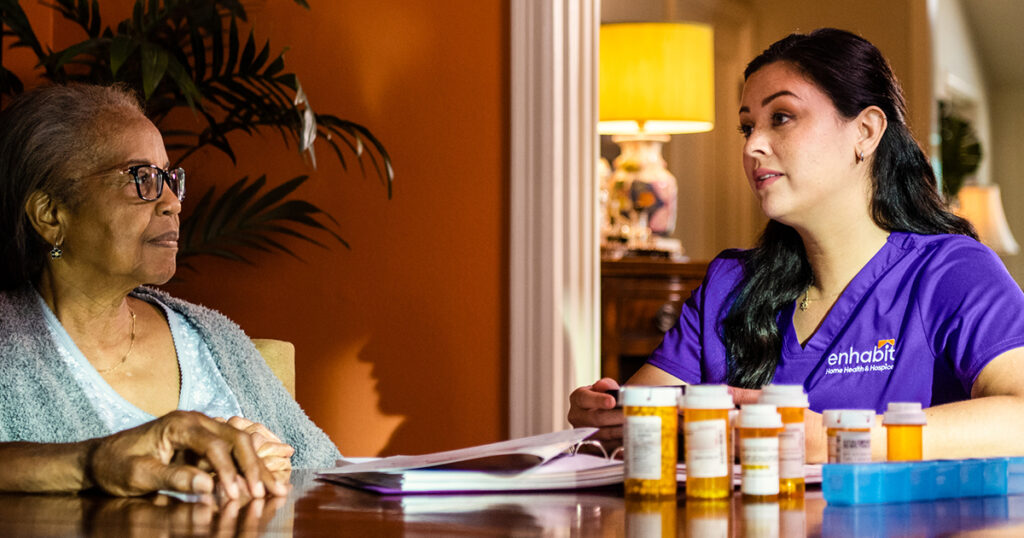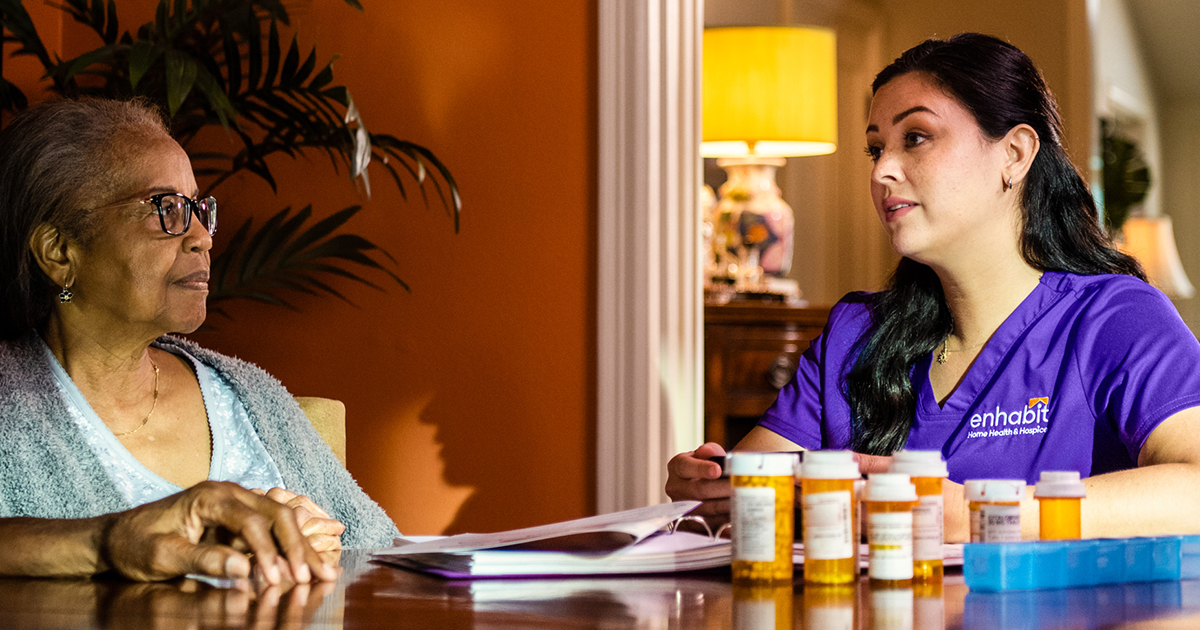Health care is increasingly shifting to the home, making it clear that home health nurses are needed now more than ever before. As it does not take place in a traditional clinical setting, many nurses and other health care professionals may have misconceptions about home health nursing.
“You hear a lot of stigma about home health nurses,” Amber, a home health nurse at Enhabit Home Health & Hospice, said. “But it’s because they don’t really understand the extent of our work or what we do. They just see it as driving around in the car all day going to see patients.”

Misconceptions about flexibility and home health nursing
A typical nursing schedule includes 12-hour shifts inside a facility while a home health nursing schedule is different. You have some flexibility to arrange the assigned visits in the most efficient way.
“I love being able to make my own schedule and not have to work 12-14 hour days where you’re stuck in a facility,” home health nurse Sheree said. “In home health nursing, I’ve been able to come home and have my evenings with my family. I don’t see myself going back to the bedside at the hospital ever.”
Driving in your car from patient to patient all day might sound like it could get stale or boring, but many home health nurses like Analysia enjoy the time they spend in their cars.
“I don’t like being in enclosed spaces for long periods of time,” she said. “So the fact that I am able to be out and about and see the sun is very nice.”
Misconceptions about home health nursing and work-life balance
Sheree had other nurses warn her about getting into home health nursing. They told her she was always going to be taking work home with her – even when she was supposed to be spending time with family.
This was a stereotype of home health nursing that turned out not to be true.
Thanks to a wise nurse trainer, Sheree learned to always finish each patient chart in the home before leaving. Finishing charting in the home while also providing superior care is the number one thing she recommends to all future home health nurses.
She says that finishing her charts in the home has even resulted in better patient outcomes because she is more attentive and present in the moment. Plus, it allows her to maintain work-life balance.
“I tell every nurse I meet or train to finish the work in the home and don’t leave a lot of charting for yourself,” she said. “No one likes homework. I prioritize time-management and get everything done during the day.”
Misconceptions about home health nursing work experience
It’s a common misconception in home health nursing that nurses have been in their field for years and years. In fact, many home health nurses are just a year or two out of nursing school.
At Enhabit, a home health nursing position requires just one year of nursing experience. While it’s helpful to feel comfortable and confident with your nursing duties, highly experienced home health nurses are not the only ones qualified for home health nursing.
If you are a nurse with strong assessment skills, good judgement and effective communication, home health could be a great setting for you.
Misconceptions about diversity in home health nursing patients
Many people assume that home health care is only for a certain demographic. Nurses may think they will see the same types of patients day after day. This is a common myth about home health nursing, even for small towns.
“I thought it was going to be just the elderly population that I was caring for,” Amber said. “I guess I didn’t realize how diverse of a patient population we have in even my small town. There are so many different people from different cultures that have different ways of living.”
Many home health nurses enjoy getting to learn about new cultures. And many get to meet a lot of new people during their time in patient’s homes.
“I think that it is so amazing to get to know so many different people and their stories because that kind of makes your life a little bit more fulfilled,” home health nurse Remmy said. “You can learn something from everybody. And the variety of people that we get to meet is truly a blessing.”
Misconceptions about autonomy and teamwork
Although home health nursing requires autonomy and self-confidence, that doesn’t mean you don’t have other staff you can lean on. Daily communication with the interdisciplinary home health teams is vital to a patient’s continuity of care.
While Enhabit nurses often visit patient’s homes on their own, they do have weekly case conference meetings with many different team members. In these meetings, they brainstorm new solutions and reflect on old issues to result in better future outcomes.
Home health nurses are responsible for coordinating all care with the patient’s physician as well. This includes communicating updates and changes, collecting and sending lab values and facilitating contact between the patient and physician.
Plus, at Enhabit, there are clinical leadership teams and office staff that are always a phone call always for support and guidance.
Career advancements
At Enhabit, employees enjoy flexibility and a vast amount of professional development opportunities, including career advancement in home health nursing.
Read about Executive Vice President of Home Health Operations Julie Jolley’s career path from a home health nurse all the way to an executive.
If you are interested in home health nursing at Enhabit, please visit our careers page for available opportunities.
 Back to Resource library
Back to Resource library
Browse top categories
Social Share
At Enhabit our patients are our number one priority. From providing the latest medical practices to building deep personal connections, we’re focused on upholding every patient’s dignity, humanity and sense of control on their health care journey.
Home health
Our home health services give patients access to the care they deserve in the comfort of their own homes. From disease and injury management to recovery from surgery, our clinicians help patients confidently achieve their healthcare goals.
Hospice care
Our hospice care services place importance on the comfort of every patient living with a terminal illness. Our caring professionals are dedicated to providing not just physical care, but spiritual and emotional support to every patient and their loved ones.






